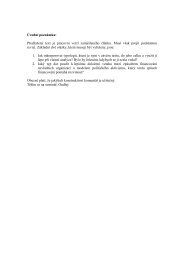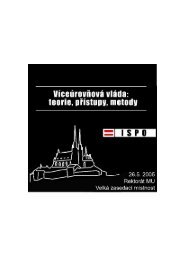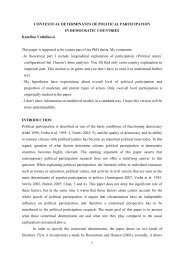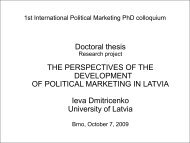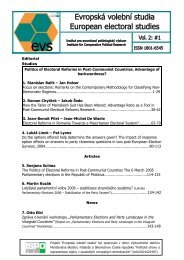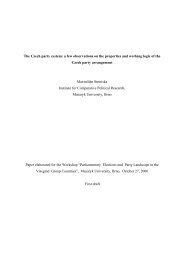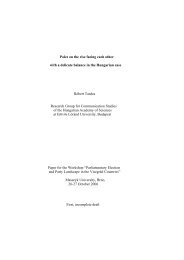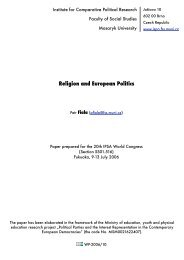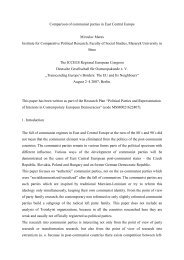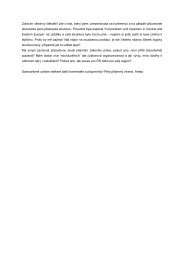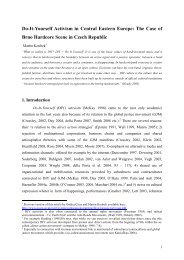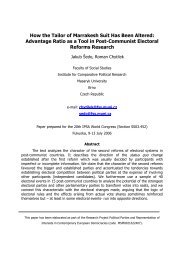Agrarian and Peasant Parties in the Czech Republic - Masarykova ...
Agrarian and Peasant Parties in the Czech Republic - Masarykova ...
Agrarian and Peasant Parties in the Czech Republic - Masarykova ...
You also want an ePaper? Increase the reach of your titles
YUMPU automatically turns print PDFs into web optimized ePapers that Google loves.
tradition) (Batory, Sitter 2004: 528). On <strong>the</strong> o<strong>the</strong>r h<strong>and</strong>, <strong>in</strong> <strong>the</strong> German Democratic <strong>Republic</strong><br />
(<strong>and</strong> <strong>in</strong> <strong>the</strong> Eastern Germany after <strong>the</strong> German unification) agrarian political parties do not play<br />
an important role. Only <strong>in</strong> contemporary Polish politics a subject with agrarian roots plays a<br />
significant role, however, <strong>the</strong> new party Self-Defense (Samoobrona) is labelled by various experts as<br />
an extreme right-w<strong>in</strong>g party.<br />
Political scientist Lubomír Kope!ek expla<strong>in</strong>ed <strong>the</strong> Polish exception as a result of <strong>the</strong> non-realized<br />
collectivization <strong>in</strong> this country dur<strong>in</strong>g <strong>the</strong> era of communism. The collectivization of peasantry<br />
dur<strong>in</strong>g <strong>the</strong> era of communism caused <strong>the</strong> strong peasantry as an autonomous <strong>and</strong> self-confident<br />
part of society was dissolved <strong>in</strong> o<strong>the</strong>r East Central European countries. Accord<strong>in</strong>g to Kope!ek,<br />
<strong>the</strong> o<strong>the</strong>r factors of <strong>the</strong> decl<strong>in</strong>e of agrarian parties were similar to those <strong>in</strong> Western Europe – <strong>the</strong><br />
decreas<strong>in</strong>g number of people work<strong>in</strong>g <strong>in</strong> agriculture <strong>and</strong> <strong>the</strong> depopulation of <strong>the</strong> countryside<br />
generally (Kope!ek 2007: 97).<br />
The Polish <strong>Peasant</strong> Party (Polskie Stronnictwo Ludowe - PSL) was founded <strong>in</strong> 1945; however, it was<br />
connected with <strong>the</strong> peasant party from <strong>the</strong> pre-war period. In 1949 it jo<strong>in</strong>ed <strong>the</strong> United <strong>Peasant</strong>s<br />
Party (ZSL), which became part of <strong>the</strong> communist-dom<strong>in</strong>ated National Unity Front (Szajkowski<br />
2005b: 482). At <strong>the</strong> end of <strong>the</strong> 1980´s <strong>the</strong> party supported anticommunist activities. In 1990 <strong>the</strong><br />
transformation of <strong>the</strong> ZSL <strong>in</strong>to PSL was f<strong>in</strong>ished.<br />
The PSL won 9,7% of votes <strong>and</strong> 48 m<strong>and</strong>ates <strong>in</strong> parliamentary election <strong>in</strong> 1991. The party<br />
achieved its best result <strong>in</strong> 1993 – 15,4% of <strong>the</strong> votes <strong>and</strong> 132 m<strong>and</strong>ates, which made it a second<br />
largest party at that time. PSL formed a coalition with <strong>the</strong> Democratic Left Alliance <strong>and</strong><br />
chairman of <strong>the</strong> party – Waldemar Pawlak – became prime m<strong>in</strong>ister. However, due to <strong>in</strong>tracoalition<br />
tensions he left <strong>the</strong> position, while <strong>the</strong> PSL rema<strong>in</strong>ed a part of <strong>the</strong> coalition up to 1997.<br />
In 1997 election it received 7,3% of <strong>the</strong> vote <strong>and</strong> 27 m<strong>and</strong>ates. In <strong>the</strong> next election <strong>in</strong> 2001 <strong>the</strong><br />
party got 8,8% <strong>and</strong> 42 m<strong>and</strong>ates, <strong>in</strong> 2005 it was 6,96% <strong>and</strong> 25 m<strong>and</strong>ates. The PSL is a member of<br />
<strong>the</strong> European Peoples Party (Fiala, Mareš, Sokol 2007: 45).<br />
The Self-Defense of <strong>the</strong> <strong>Republic</strong> of Pol<strong>and</strong> (Samoobrona Rzeczpospolitej Polskiej) keeps an<br />
important position <strong>in</strong> <strong>the</strong> Polish party system. The current leader of this party Andrzej Lepper<br />
organized <strong>in</strong> 1991 anti-governmental protests of Polish farmers. In 1992 Trade Union of Farmers<br />
“Self Defense” (Zwi#zek Zawodowy Rolnictwa „Samoobrona“) was registered <strong>and</strong> a short time later<br />
<strong>the</strong> party called Agreement “Self Defense” of Pol<strong>and</strong> (Przymierze „Samoobrona“ Polski) was created.<br />
It won medial attention due to radical actions of farmers; however, its electoral results were weak<br />
<strong>in</strong> <strong>the</strong> 1990´s. In 1999 it was renamed to Self-Defense of <strong>the</strong> <strong>Republic</strong> of Pol<strong>and</strong>.<br />
The leader of <strong>the</strong> party Andrzej Lepper became popular due to his radical activities <strong>and</strong> criticism<br />
of <strong>the</strong> established politics. In 2001 <strong>the</strong> party won 10,2% of <strong>the</strong> votes (53 m<strong>and</strong>ates) <strong>and</strong> got<br />
10



